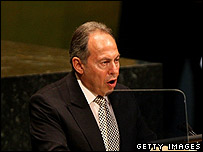 Lebanese MPs are facing a deadline of midnight to appoint a new president. However, mediators fear rival camps will fail to reach a deal, plunging the country into a deeper political crisis. Attempts to elect a new president over the past two months have been hampered by rivalry between pro and anti-government supporters.
Lebanese MPs are facing a deadline of midnight to appoint a new president. However, mediators fear rival camps will fail to reach a deal, plunging the country into a deeper political crisis. Attempts to elect a new president over the past two months have been hampered by rivalry between pro and anti-government supporters.
"A miracle is still possible tomorrow but I think it’ll be a bit complicated," said French Foreign Minister Bernard Kouchner. A vote in parliament has been scheduled for 1300 (1100 GMT) on Friday, 11 hours before the end of current pro-Syrian president Emile Lahoud’s term.
No compromise The election of a president requires a two-thirds majority, which means that the anti-Syrian ruling bloc – with its slim majority – cannot force its preferred candidate through parliament. A deal with the opposition is therefore required. The rival factions cannot agree on a compromise candidate,.
However, President Lahoud has vowed not to hand over power to Mr Siniora, and said he would name army chief General Michel Suleiman as his provisional successor instead.
|
Massimo D’Alema
Italian Foreign Minister |
Mr Lahoud has also said any election would require a quorum of two-thirds of the number of deputies.
The opposition has warned it may boycott Friday’s session, thus ensuring that the vote will not be quorate and any vote will be invalid.
The political deadlock has already led to the vote being postponed four times since 25 September.
The BBC’s Kim Ghattas in Beirut says the failure to find a compromise has raised fears of civil strife, including the possibility that the opposition could create a rival administration as happened during the civil war.
International efforts
Our correspondent says the issue is turning into a regional and international affair.
The US, Russia, Syria and Iran are all intensely involved and there has been a lot of diplomatic shuttling between Damascus, Moscow, Tehran and Paris.
|
LEADING CANDIDATES
Michel Aoun: Opposition candidate. Former army commander who fought Syria during civil war. Returned from exile in 2005. Vocal opponent of government
Michel Suleiman: Army commander since 1998. Electing him requires constitutional amendment
Riad Salameh: Central bank governor since 1993. Widely respected at home and abroad. Election requires constitutional amendment
Nassib Lahoud: Government candidate. Former US ambassador. Leading industrialist
Boutrous Harb: Pro-government candidate. MP and former minister
Jean Obeid: Possible consensus candidate. Foreign minister 2003-2004
Michel Edde: Possible consensus candidate. Ex-minister
Robert Ghanem: Possible consensus candidate. Member of Parliament
|
US Secretary of State Condoleezza Rice telephoned several of the country’s top leaders on Monday.
Foreign Ministers from France, Spain and Italy have spent several days in Lebanon, meeting with rival groups in an attempt to break the deadlock.
"It is up to us to make this appeal for this dialogue to continue and to look for consensus, and we are available for all Lebanese political groups and forces to help in these efforts," said Spanish Foreign Minister Miguel Angel Moratinos.
His Italian counterpart, Massimo D’Alema, was pessimistic about the prospects for a resolution of the crisis before the midnight deadline:
"Tomorrow, I don’t believe there will be an election and this will create difficult conditions, but this is not the end of the world," he said.
Last-minute initiative
Fears are growing that failure to elect a president will bring more turmoil to Lebanon.
The army has increased its presence on the streets of Beirut and set up checkpoints, some schools have cancelled classes until Monday, and the ministry of interior has suspended all firearm permits until further notice.
In an effort to broker a poltical compromise, Michel Aoun, the leader of a Christian opposition party, proposed a deal, whereby an interim president – chosen by him, but not a member of his parliamentary bloc – would serve until parliamentary elections were held in 2009, at which point a new president would take over for a full six-year term.
As part of the plan, the ruling majority would get to select a prime minister, but again, only on condition that the chosen person came from outside the ruling parliamentary bloc.
The ruling majority dismissed Mr Aoun’s plan, however, saying that it was unconstitutional.



